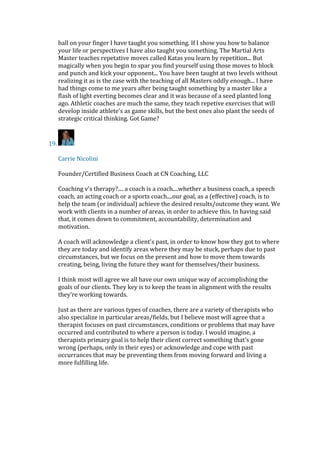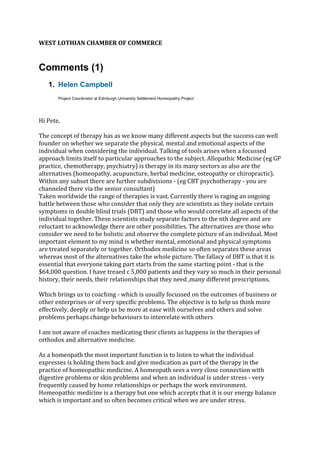This document discusses the differences between coaching and therapy. It provides definitions of coaching and therapy from various sources. The main difference identified is intention - the intention of a therapist is to heal problems from the past/present, while the intention of a coach is to facilitate learning and development towards future goals. There is some overlap when problems from the past impact present goals. Tools can be used for both coaching and therapy depending on intention and the individual's readiness. Comments from coaches and therapists provide their perspectives and experiences with both approaches.
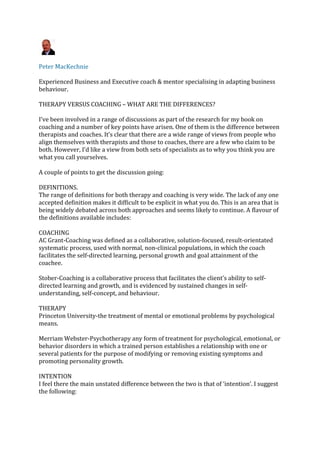
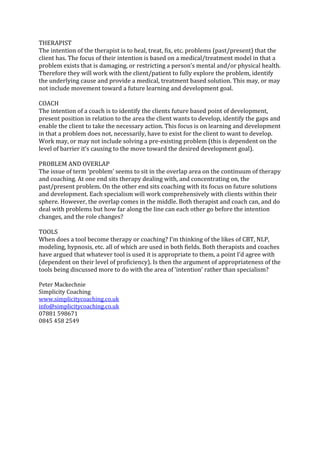
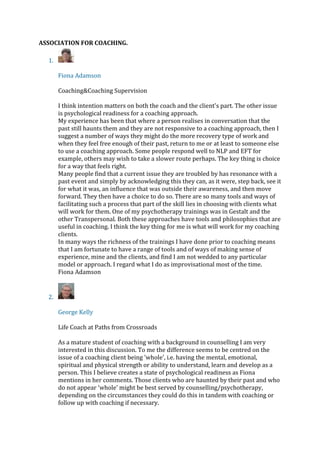
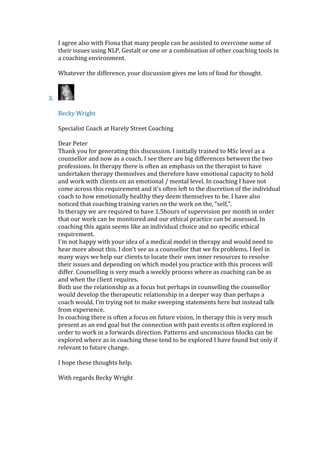
![CMI
1.
Natalie D Kershaw
Founder, Practitioner and Trainer
I'm lucky because I have the ability to do both but I can see that if you study one
area in particular you may believe that method to be the right one - it of course
also depends on the practitioner.
In addition, and I don't know if this will help but I thought about something that I
said a while ago - the title of the [coach / therapist] is important. I prefer
"practitioner" to be honest although my official title is adviser and my studies in
the holistic disciplines asked me to chose either from therapist, practitioner or
professional - interesting isn't it that I choose practitioner to cover all I do?
Does the title you give yourself reflect the role that you play and do with the
client and how that client perceives you? I think so. As a business counsellor I
end up with all sorts of issues from the clients despite the fact from the very first
meeting parameters are set - i.e. what role I play and yet because I had
"counsellor" in my title (I wasn't a qualified counsellor incidentally) I had ".....and
my son won't even get out of bed...!" and other such similar stories as though I
could do something about it - as a business adviser - that’s what I am and do - I
advise in business and that’s that - more clear cut and defined.](https://image.slidesharecdn.com/coachingvtherapy-12766091991242-phpapp02/85/Coaching-v-therapy-Reply-Compilation-5-320.jpg)
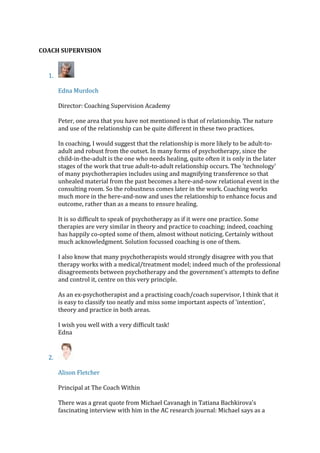
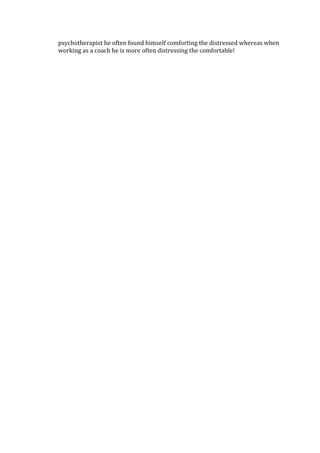
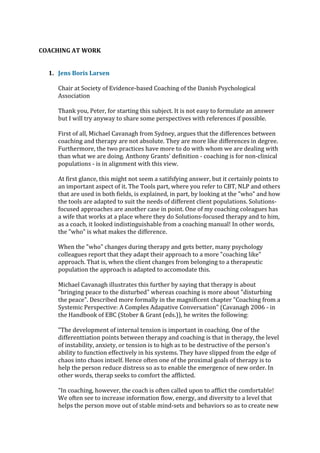
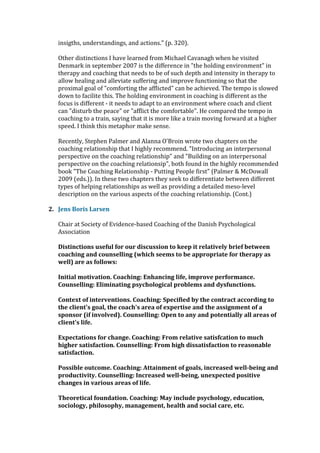
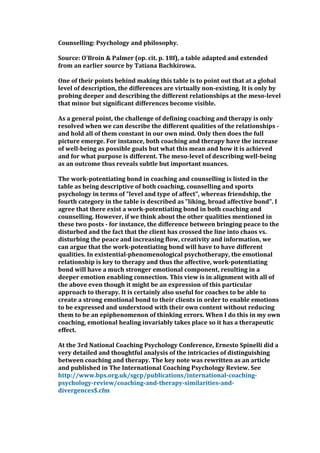
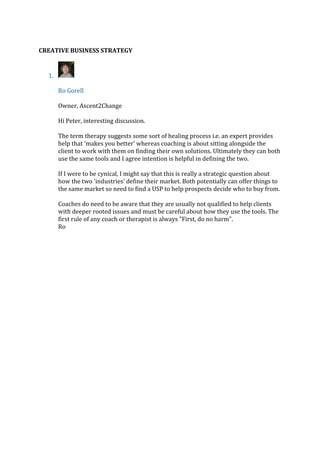
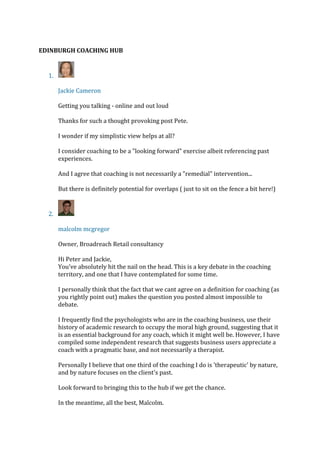
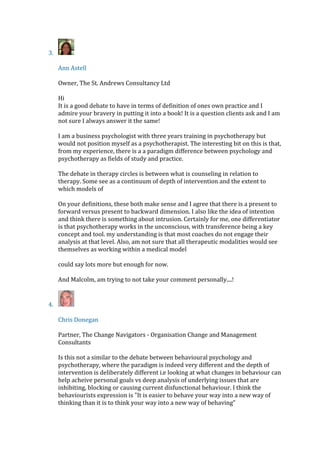
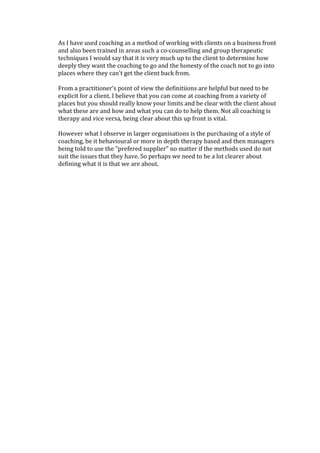
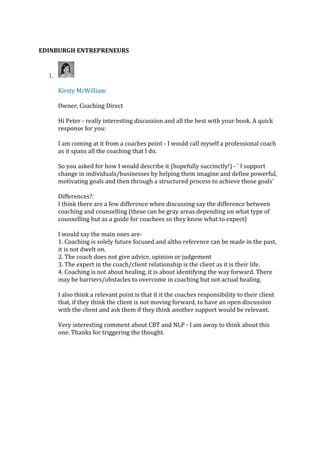
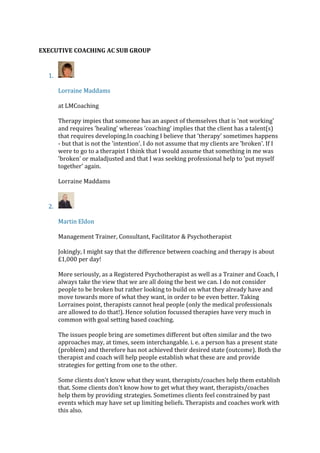
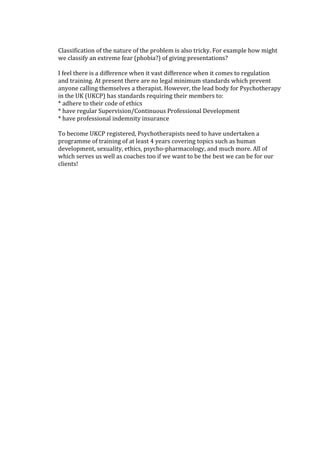
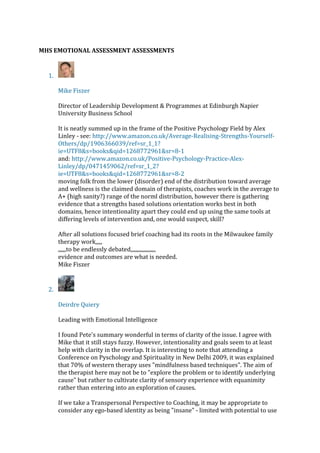
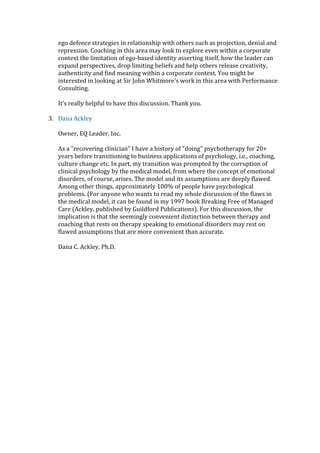
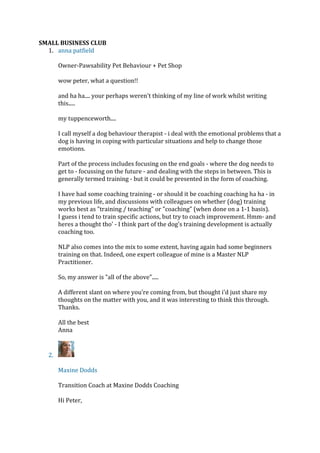
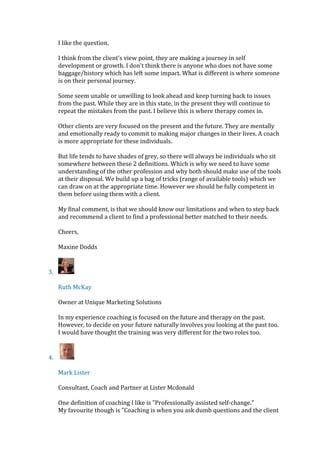
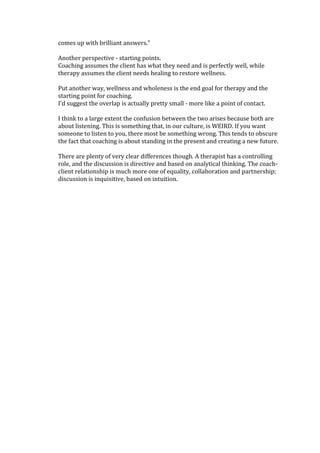
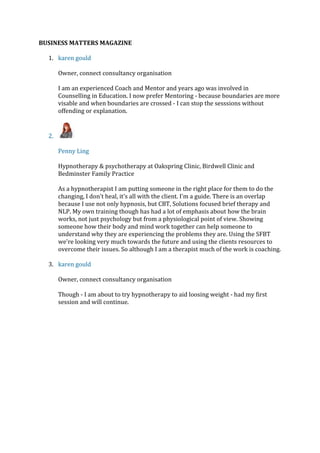
![COACHING - a subgroup of WACCM TOO group on LinkedIn
1.
Pasquale Scopelliti (pasquale@theconsigliori.com)
The Consigliori at TheConsigliori.com Newsletter
Hi Peter, thank you for the stimulating question, and all your effort to lay out an
intelligent basis to dive in. I must confess that I'll have to do a bit of study to
catch up with your many very specific terms and areas listed above, and I will do
so. I didn't want to wait, though, to offer you an initial response just to the
question itself. I hope you don't mind...
From my point of view the difference is profound, and significant. I'm a coach,
not a therapist. Yet, I employ all kinds of therapeutic techniques in my coaching.
How do we parse out the line?
For me, it really does come down to just this one, most important parameter. As
a coach, I'm invested into the outcome of the game itself, together with my client.
Were I to perform therapy, I'd be there as an aid to, but not participant in the
game at hand.
Perhaps an example or two will help. When my clients ask me for my thoughts
about ROI, I take it upon myself to rise to their question, and search very hard for
such justification, together with them. If I were a therapist, I'd reject the
question. Therapy is undertaken to find and adapt to the truth, and is a cost. If
there is economic gain, wonderful, but that's not the driver.
Another example is this. When my clients ask me where I stand, or what my story
is, or who I am, or what any of this means to me, I give them direct answers. In
fact, I let all clients know that I am the opposite of values free, as would be a
therapist. I express my values, often quite boldly. In our work, we seek to find
values fits, where our mutual values compound excellence on the mission to win
the game at hand!
Ach, I'm droning on already. Thanks for asking the question. I will read up on
your terms above and get back to you with some more specific replies to your lay
out.
Pasquale
The Consigliori
2.
John W. Countz [LION - Top Linked]](https://image.slidesharecdn.com/coachingvtherapy-12766091991242-phpapp02/85/Coaching-v-therapy-Reply-Compilation-24-320.jpg)
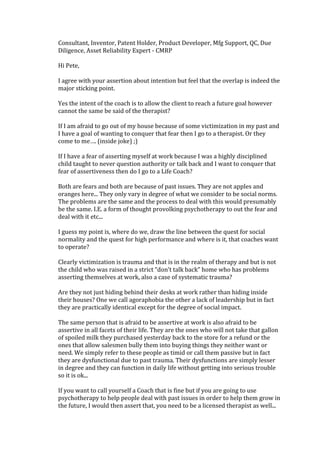
![It is my opinion that there is too much room for error and mischeif for letting
untrained people monkey about in the heads of potentially already dysfunctional
people...
3.
John W. Countz [LION - Top Linked]
Consultant, Inventor, Patent Holder, Product Developer, Mfg Support, QC, Due
Diligence, Asset Reliability Expert - CMRP
Pasquale, what a delight you are! Thanks for expanding the commentary.
The defining difference being ROI is interesting to say the least. But one wonders
if it is particularly safe to be expressing your own values and opionions while
employing psychtherapudic methods...
It could be observed that your clients have the at least the presence of mind to
expect an ROI and that says something for sure... However we have also seen
some Life Coaches specializing in Victimisation and ADHD which are clearly
traditionally clinical therapudic issues... These are also deviod of business
processes and therefore have no clear hard dollar ROI...
ROI in personal peace and quality of life yes! What we in the business world
might call a soft dollar ROI or a Cost Avoidance ROI...;)
Clearly not all coaching has an ROI in hard dollars... What would Mikkel's ROI be
if he were paying for Diana's coaching? Nothing in dollars but potentially a
wealth in happiness. There is no difference in a successful therapy session that
helps a patient gain a happier life so I must reject the ROI argument as one that
can be applied across the industry as a defining factor. I do however respect your
using it to define and limit your own personal practice.
If all coaches were as responsible then i think this discussion might not have
grown legs...:)
Cheers,
John
the problem;)
4.
Diana Baker
Personal Performance Coach Student](https://image.slidesharecdn.com/coachingvtherapy-12766091991242-phpapp02/85/Coaching-v-therapy-Reply-Compilation-26-320.jpg)
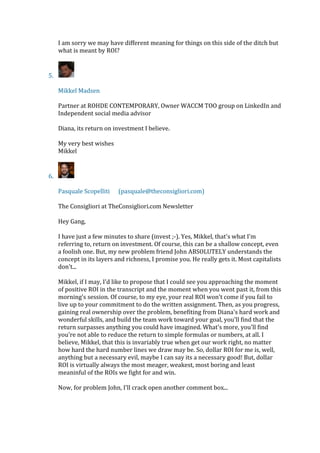
![7.
John W. Countz [LION - Top Linked]
Consultant, Inventor, Patent Holder, Product Developer, Mfg Support, QC, Due
Diligence, Asset Reliability Expert - CMRP
Yes Return On Investment... Usually expressed in hard dollars...However cost
avoidance can be considered a soft ROI meaning ther was no profit to install
safety barriers but you likely avoided a wrongful death suit ie soft dollars etc.
8.
Pasquale Scopelliti (pasquale@theconsigliori.com)
The Consigliori at TheConsigliori.com Newsletter
I need a moniker. Nope, I'm surely not allowed the Walton's famous John-boy, my
new friend might feel demeaned as opposed to endeared. Problem John worked,
but I'm not sure it can stick. I'll try out QJ for Quality John...no, QMJ, Quality Man
John. Hey, I kind of like it!
Okay, let me know if you hate it, but for now you're QMJ...okay?
QMJ, first off, thank you so very kindly for the prop to my "responsibility." Do
understand, however, that I guarantee you there are blind spots, gaps in MY
reasoning, and I'm dependent on brilliant analysts like you to find them. So, no
free passes here, man, not for a second (please?)! Yes, I am quite responsible.
But, I still might be wrong, maybe even dead wrong. I beg your readiness to be, if
not purely devil's ongoing advocate, at least a royal pain. What could be more
righteous, eh?
That protocol covered, I have a couple of messy links to offer. Here they are, and
then I'll try to pull some pieces together before I light out of here.
http://en.wikipedia.org/wiki/Lay_analysis
http://www.amazon.com/Question-Lay-Analysis-Standard/dp/0393005038
I'm actually unhappy with both links. The widipedia article, sorry, simply sucks.
The book itself is a glory. But, I hate offering an amazon link to reference a book.
So...
I'll just blather a bit. Freud came out, as strong as strong can be, on the side of
lay, that is NON-medical analysis. Do not, however, confuse "lay" with "non-
professional". He actually didn't care, whether one was a pro or not, and believed
that the anaylsts contribution came, not from education or professiona](https://image.slidesharecdn.com/coachingvtherapy-12766091991242-phpapp02/85/Coaching-v-therapy-Reply-Compilation-28-320.jpg)
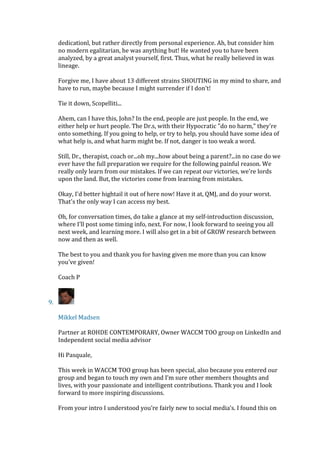
![youtube.com about how to behave. http://www.youtube.com/watch?
v=DIyr5TXqe8Y . Hope you enjoy it, only a bit of fun and not to offend anyone.
Maybe it can spice up your weekend studies of coaching models.
Until next week, I wish you a good long and relaxing weekend.
My very best wishes,
Mikkel
10.
John W. Countz [LION - Top Linked]
Consultant, Inventor, Patent Holder, Product Developer, Mfg Support, QC, Due
Diligence, Asset Reliability Expert - CMRP
From what I gathered from the Wiki the term Lay meant having no formal
medical training. Remember however back then Freud was referencing medical
training to be something completely separate from psychology, which really was
not yet an accepted medical art. I.E. his intent was not to say it was ok not to have
any training, just that it was ok that you were not an MD because that brought
little or nothing to the table in psychoanalysis... One could argue that some
training is required to safely administer psychoactive drugs that might interact
with other drug therapies ongoing by an MD etc. However, at the time I think he
was referencing the process of psychoanalysis and psychotherapy without the
employment of psychotropic drugs, which were developed later.
I think at its root, he was simply saying, that this was an entirely new area in
which traditional medicine had no dominion, claim nor advantage in practice.
As to lineage i feel it was more in respect to following the industry pioneers that
had been doing the groundwork so as to become an expert yourself built on their
work. All sciences have a lineage in this way during their early stages.
I am not really a fan of Freud myself more a fan of Carl Jung...;)
Freud concentrated on the negative baser instinctive or animal mind while Jung
focused on the associative, creative and positive mind of man...
Or if you will the Animal side vs the Spiritual side of man...
Clearly both are important to total healing and wellbeing as well as being an
important part of a true understanding oneself...
These men have handed those of us who have the capacity to understand, the
keys to manipulating he human mind. To me that infers a degree of responsibility
on those that would practice in those techniques.](https://image.slidesharecdn.com/coachingvtherapy-12766091991242-phpapp02/85/Coaching-v-therapy-Reply-Compilation-30-320.jpg)
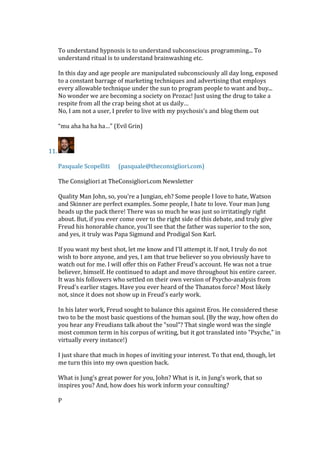
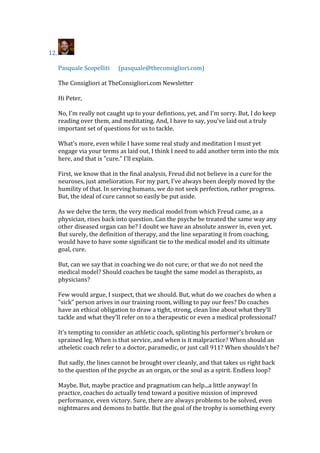
![coach signs on for, regardless of context. I suspect therapists love trophies as
much as anyone, but that really is not their measure of success.
So, what does therapeutic cure look like, impossible though it may be in the
absolute? Why, low and behold, it looks like normality. Mabye we should call it
good normality since so many people find horrible lives their truly normal
condition. But, perhaps we can assign to therapy the pragmatic leaning of "fixing"
lives that have fallen out of their normal path.
In law, divorce law to be specific, the phrase, "lifestyle to which they've become
accustomed" is a very real, tangible and not particularly difficult one to establish
intellectually. Perhaps in therapy and coaching we can import some of that
clarity.
Perhaps a therapist's challenge is to help re-establish or gain normality, in a good
way, when its been lost or when failure to thrive, in that low level normal sense,
has occured. Perhaps the lifestyle to which we coaches can attach is that of the
battle for the next level of thrilling victory.
Yes, I'm certain a therapist is thrilled when he sees any gain, of any kind. I truly
don't mean to diminish the sister art. Yet, as an avowed coach, the lifestyle I'm
accustomed to enjoys a set of new victories that, no, do not equal a cure, but they
do, I suspect, differentiate my art.
What do you think?
Pasquale
13.
John W. Countz [LION - Top Linked]
Consultant, Inventor, Patent Holder, Product Developer, Mfg Support, QC, Due
Diligence, Asset Reliability Expert - CMRP
Hi Pasquale,
Would that all coaches would restrict their activities to lending high performance
to normal people then I think we would all be in agreement that there was a clear
line in the sand anf that Coaching and Therapy were clearly definable. I think you
have forestated the noble position that should be assumed by the title Coach...
However I can't see that happening if we are Coaching robbery and rape victims
who have clearly been deeply traumatized and have, due to that trauma, fallen
off the normal wagon so to speak.
We also have Coaches specializing in ADHD cases which are clearly not normal
behaviors but rather a mental illness...hence the term "Disorder" in the](https://image.slidesharecdn.com/coachingvtherapy-12766091991242-phpapp02/85/Coaching-v-therapy-Reply-Compilation-33-320.jpg)
![acronym.........
This only makes the case for the need for some regulation along the lines of what
Coaching should be allowed to encompass before considering malpractice.
As I said before this will likely be settled in court and by insurance companies in
the end...
What I would suggest to all life coaches, until the industry is regulated that you
regulate yourselves and put clear verbage in your coaching contracts that
expressly states your intent and scope of improving performance rather that
treating the ill or dysfunctional...
If you leave yourselves open then when the first lawsuit happens you can expect
a chain reaction of investigations and lawsuits to ensue so my advice is to cover
thy backside past, present and future...
14.
John W. Countz [LION - Top Linked]
Consultant, Inventor, Patent Holder, Product Developer, Mfg Support, QC, Due
Diligence, Asset Reliability Expert - CMRP
Oh yes Pasquale,
Yes Jung was heavily influenced by the work of Freud as he was befriended and
mentored by him for many years.
However where Papa Sigmund got stuck focusing everything on sex and animal
nature, Karl went on to explore all of the other realms of human existence like
art, religions, cultures, mysticism, occult, the effects of ritual and symbols on the
psyche etc. He had an extremely open and inquisitive mind… I feel that is what is
required to find real truth…
I consider Karl Jung the Albert Einstein of the mind if you will as he applied a
theory of relativity across the human experience rather than across physics…;)
Sure sex is a primal force in all procreative beings but we are so much more than
that as human beings. Can you see sex I our art and religion and rituals? Of
course but is that all you see? Certainly not…
One could argue that if you have no air that breathing is the overriding sub-
conscious concern or if you have no food then eating becomes the king! If you
have plenty of sex it is the same as plenty of air or food… No doubt it’s a craving
but not the only one and certainly not in older men/women who are no longer
functional or hormonally inclined so to speak.](https://image.slidesharecdn.com/coachingvtherapy-12766091991242-phpapp02/85/Coaching-v-therapy-Reply-Compilation-34-320.jpg)
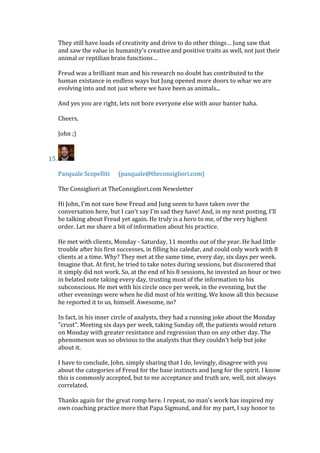
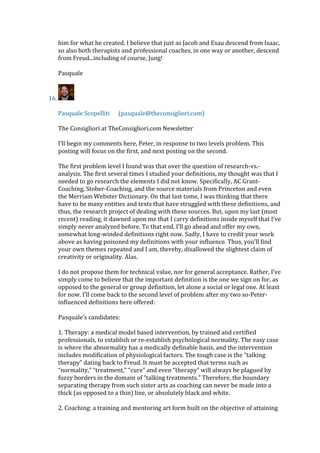
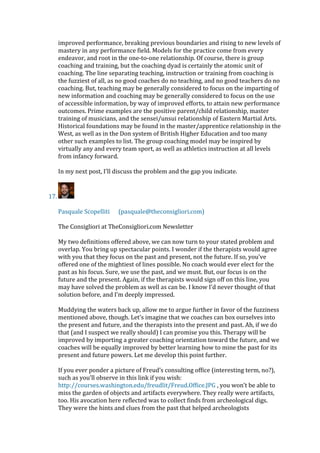
![(considered to be the most serious of true scientists, of course) in their mission
to literally unearth the past. Freud felt, as many would agree, that this is
mandatory if we are to understand the present. And, as such, they were his most
beloved metaphor for his art, which he of course thought of as a pure science. If
you’re interested further, this link shows the collection itself:
http://courses.washington.edu/freudlit/Antiquities.JPG .
I propose that we coaches will often find exactly the clues we need, in order to
explode present and future performance with our clients by a more historical
approach to understanding the entire story of our clients’ lives and work
histories.
Muddy waters being muddy, though, I ask, what coach would ever disavow the
term “dream” and for emphasis, dream for the future? Why, without it, we really
wouldn’t have a profession. I propose that T. H. White’s book title, of his famous
Arthur story (the inspiration for the Disney film called “The Sword in the Stone”)
is instructive. He terms Arthur “The Once and Future King.” Well, I propose that
our art is actually centered in exactly that. The dreams our clients share with us
and are driven by, truly are once and future dreams. They root into the past, but
of course, cover the future where they will be realized, or not, as a result of effort
in the ever-present moments, as they flow, of the continuous present.
Pasquale
18.
John W. Countz [LION - Top Linked]
Consultant, Inventor, Patent Holder, Product Developer, Mfg Support, QC, Due
Diligence, Asset Reliability Expert - CMRP
Don't think the therapists will sign off on that guys. You both look into the past to
identify issues and you both seek to modify future behavior.
The only line that can be defining here seems to be that of normality...
Does that excluse eccentricity? Wow that a tough one... Well If you were goint to
be honest about Coaching then you would have to say that you must start with a
"normal person" or if you will "a person that is able to function in society in a
normal and healthy way". That normal person would have to be seeking higher
performance in their profession or daily life or desirous of a more fufilling life
etc.
Of course this must then exclude ADHD folks as well a trauma victims whose
normality has been upset by a traumatic experience.
As to teaching and coaching... A coach teaches no matter what you say...
Subliminal teaching does count as teaching guys... If I show you how to balance a](https://image.slidesharecdn.com/coachingvtherapy-12766091991242-phpapp02/85/Coaching-v-therapy-Reply-Compilation-38-320.jpg)
